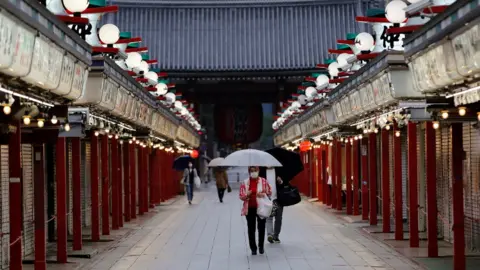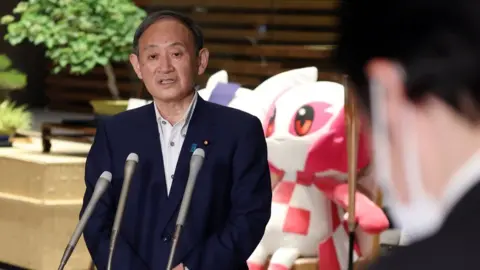Japan extends Covid-19 restrictions as Olympics draw nearer
 Reuters
ReutersA state of emergency has been extended in several regions of Japan as Covid-19 cases surge, less than three months before the Tokyo Olympics.
Restrictions in Tokyo, Osaka, Hyogo and Kyoto had been due to end on 11 May, but will now remain in place until the end of the month.
Prime Minister Yoshihide Suga also said they had added Aichi and Fukuoka to the regions under a state of emergency.
The move casts more doubt on whether the Olympics will go ahead as planned.
Under the state of emergency, bars and restaurants have had to shut or stop serving alcohol, while cinemas and karaoke parlours have been closed.
Mr Suga said the government had hoped that a "short and powerful" state of emergency would contain the country's fourth wave of the virus.
But, he said, the number of new cases was still "at a high level in major cities", and "hospitals continue to be overwhelmed" in some areas.
 EPA
EPAOsaka Governor Hirofumi Yoshimura also warned that his region's medical system was "reaching breaking point".
In one nursing home in Osaka 61 residents were infected with the virus, and 14 died while waiting to receive hospital treatment, broadcaster NHK reported.
Earlier on Friday Yasutoshi Nishimura, the economy minister who is also in charge of Covid-19 measures, said variant strains of the virus were spreading rapidly.
However, local media report that some rules will still be eased, such as allowing a limited number of fans back into sports stadiums, despite other restrictions being extended.
The Olympics are due to begin in Tokyo on 23 July. They were postponed from 2020 because of the pandemic.
More than 10,000 athletes from 200 countries and regions are due to take part.
Japan's Games president Seiko Hashimoto said they would welcome a visit by the International Olympic Committee (IOC) president Thomas Bach this month, but that it would be very difficult to organise with the restrictions now having been extended.
